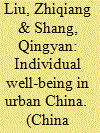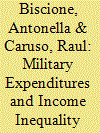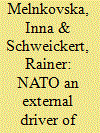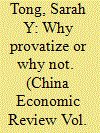|
|
|
Sort Order |
|
|
|
Items / Page
|
|
|
|
|
|
|
| Srl | Item |
| 1 |
ID:
156462


|
|
|
|
|
| Summary/Abstract |
The existence of economic slack or inefficiency is a common phenomenon of economies that operate under mandatory central planning. It implies that the economy operates in the interior of its set of production possibilities and not on its frontier. It also implies that output can be increased without any increase in the inputs if the constraints which prevent the economy from operating on the frontier in the first place are removed. Thus, there is “surplus potential output” that is not directly observable and cannot be identified by conventional analysis of the relationship between inputs and output alone. The objective of this study is to attempt to identify and estimate the surplus potential output in the Chinese economy prior to its economic reform in 1978. This will help answer the question of how much of the Chinese economic growth since 1978 can be attributed to the reduction and elimination of the pre-existing economic slack. This question is important because the increase in output due to the reduction or elimination of the economic slack can only take effect once and cannot be continuing. It will also affect the attribution of the sources of Chinese economic growth. Our investigation suggests that a reasonable estimate of the magnitude of the surplus potential output of the Chinese economy on the eve of its reform is approximately 50% of the actual realized output in 1978.
|
|
|
|
|
|
|
|
|
|
|
|
|
|
|
|
| 2 |
ID:
116508


|
|
|
|
|
| Publication |
2012.
|
| Summary/Abstract |
Using household survey data, we study the determinants of individual well-being in urban China, emphasizing particularly the role of income expectations. First, we find that individual well-being increases contemporaneously with own income and decreases with community's average income, consistent with findings reported in previous studies. This result holds when we replace income with consumption and when we consider employment and health status of other family members. Second and more important, we find that income expectations have a positive and significant effect on individual well-being. This result is robust to alternative model specifications and to controls for optimistic personality. Instrumental variable estimates and endogeneity tests suggest that the positive relationship between well-being and income expectations is genuine. Our finding has the potential to explain why reported well-being has declined in China despite the spectacular economic growth in the past decades.
|
|
|
|
|
|
|
|
|
|
|
|
|
|
|
|
| 3 |
ID:
110020


|
|
|
|
|
| Publication |
2012.
|
| Summary/Abstract |
This article offers a comprehensive analysis of the different effects of the economic crisis from 2008, across all transition economies with a testable framework, that relates vulnerability to specific forms of development since 1989. The key to the framework is the identification of forms of integration into the international economy, with distinctions between different export structures and dependence on other sources of foreign-currency earnings. These created channels for transmission of the crisis which differed between countries. The analysis draws on a three-level research design, combining a variable-oriented regression analysis with case-oriented comparisons among similar cases, and within-case analysis of individual countries.
|
|
|
|
|
|
|
|
|
|
|
|
|
|
|
|
| 4 |
ID:
138140


|
|
|
|
|
| Summary/Abstract |
What lessons can last comers, like North Korea and Myanmar, and the aid community that stands ready to assist them, learn from the experience of Vietnam? What motivated Vietnam to abandon Soviet-style central planning for a market economy (albeit one with a socialist orientation)? Did foreign technical assistance play an important role in designing and assisting in the implementation of the reforms that have propelled growth in Vietnam? Does Vietnam’s experience support or contradict the increasingly fashionable view that institutional change is a prerequisite to successful economic reform? Can a country, such as North Korea, emulate the transition experience of Vietnam and expect similar success?
|
|
|
|
|
|
|
|
|
|
|
|
|
|
|
|
| 5 |
ID:
177826


|
|
|
|
|
| Summary/Abstract |
This paper contributes to the literature on military spending by analyzing the relationship between military spending and income inequality in a panel of transition economies over the period 1990–2015. In particular, we exploit three different measures of military expenditures: (i) military spending in absolute terms; (ii) military expenditures per capita; (iii) military burden, namely the ratio between military expenditure and GDP. Findings highlight a positive relationship between military expenditures and income inequality captured by means of three different measures of inequality. Results are also confirmed after we performed a variety of robustness tests. Other results are worth noting and somehow puzzling. For example, military conscription appears to have a redistributional effect and when considering a non-linearity the results show that there could be a concave relationship between military spending and income inequality. In addition, when testing for the ‘crowding-out argument’ results show that expenditures for subsidies are negatively influenced by military spending so confirming the crowding-out argument but there is no significant evidence when considering education and health expenditures.
|
|
|
|
|
|
|
|
|
|
|
|
|
|
|
|
| 6 |
ID:
105042


|
|
|
|
|
| Publication |
2011.
|
| Summary/Abstract |
So far, economic analyses of NATO enlargement have been restricted to aspects of regional security while political analyses focused on indirect peace-building effects on democracy in the first place. Our panel regressions for 25 post-communist countries for the period from 1996 to 2008 reveal that direct incentives provided by NATO pre-accession are important for broad-based institutional development. Results are even more robust than for variables measuring EU pre-accession or NATO membership effects. This supports the argument that NATO can act as a transformative power and should strengthen its political agenda.
|
|
|
|
|
|
|
|
|
|
|
|
|
|
|
|
| 7 |
ID:
182551


|
|
|
|
|
| Summary/Abstract |
The dissolution of the Eastern Bloc at the end of the Cold War compelled most of the centrally-planned economies to adjust their economic order to become free market economies. During the transition process, most of those countries experienced severe external debt overhang problems, due to excessive budget deficits and rapid liberalization of foreign trade and capital account regimes. In addition, most of those countries were facing political unrest due to internal and external conflicts by the end of the Cold War, with rampant weapons proliferation and the arms race. By employing the fixed effect panel threshold regression approach, we unveil the non-linear relationship between military spending and external indebtedness, which has not been examined for the selected twelve transition economies over the period from 1997 to 2016. Our findings reveal the presence of double threshold effects that are embedded in military expenditure, and the debt-accelerating effect of military spending emerges after the first regime. In the early stages, countries tend to finance military expenditure with the help of domestic savings, whereas the requirement for external borrowing emerges later as domestic savings become inadequate. We have also produced some crucial policy recommendations to reflect our findings.
|
|
|
|
|
|
|
|
|
|
|
|
|
|
|
|
| 8 |
ID:
103904


|
|
|
|
|
| Publication |
2011.
|
| Summary/Abstract |
The promotion tournament as a potentially important incentive mechanism for top management in transition economies has not been examined by the literature on managerial incentives. This paper attempts to fill this important gap in the literature. The paper begins with modifying the empirical predictions previously-derived from the tournament theory to the context of transition economies in which state ownership still plays a significant role in publicly-traded firms. Specifically, we test the following two hypotheses. First, the winner's prize will need to increase in order to prevent each contestant from lowering his/her effort level in the face of a larger contestant pool. Such an optimal response of the winner's prize to the size of the contestant pool is more evident for China's listed firms that are less controlled by the state. Second, the winner's prize will also need to rise in order to prevent each contestant from reducing his/her effort level in the face of greater market volatility (or more noise in the performance measure used to determine the tournament winner). Using comprehensive financial and accounting data on China's listed firms from 1998 to 2002, augmented by unique data on executive compensation and ownership structure, we find evidence in support of both hypotheses. Finally, we also find evidence suggesting that an increase in the winner's prize will result in improved firm performance due to enhanced managerial effort, and that the performance effect of the winner's prize is greater for China's listed firms that are less controlled by the state. As such this paper provides yet another piece of evidence that ownership restructuring may be needed for China to successfully transform its SOEs to efficient modernized corporations and reform its overall economy.
|
|
|
|
|
|
|
|
|
|
|
|
|
|
|
|
| 9 |
ID:
153576


|
|
|
|
|
| Summary/Abstract |
In this article we trace the history of state-owned enterprise (SOE) reform in Laos. Commencing in 1986, SOE reform was a component of the New Economic Mechanism (NEM), a program of changes that moved the economy toward one based on market principles. SOE reform is located within the broader reforms associated with the NEM and is divided into three distinct phases. We present and analyze a case study of the reform of the national electricity company (Électricité du Laos) in terms of a stages model of power sector reform. The overall findings show the importance of context in influencing the specific nature of SOE reform.
|
|
|
|
|
|
|
|
|
|
|
|
|
|
|
|
| 10 |
ID:
090794


|
|
|
|
|
| Publication |
2009.
|
| Summary/Abstract |
Using a firm-level panel dataset which covers over 50,000 state-owned enterprises (SOEs) across China for the years 1998 to 2003, we attempt to answer the question of why some SOEs are privatized while others remain under state control. By applying a Heckman two-stage procedure, we investigate the causes that determine SOE privatization outcome. We find that the factors most conducive for privatization are the rise of competition, the increase of FDI concentration of both industries and provinces, and the hardening of SOEs' budget constraints. Moreover, it is shown that relatively better performing SOEs, measured by per employee value-added, profitability, and export propensity, are more prone to privatization. However, we should be careful in interpreting this result, due to the problem of selection bias. Results of the first-stage selection equation suggest that many small and non-performing SOEs dropped out of the sample, possibility due to privatization. What we can conclude is that, among the remainders, the better performing SOEs are more likely to be privatized.
|
|
|
|
|
|
|
|
|
|
|
|
|
|
|
|
|
|
|
|
|